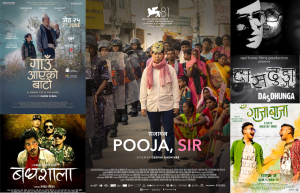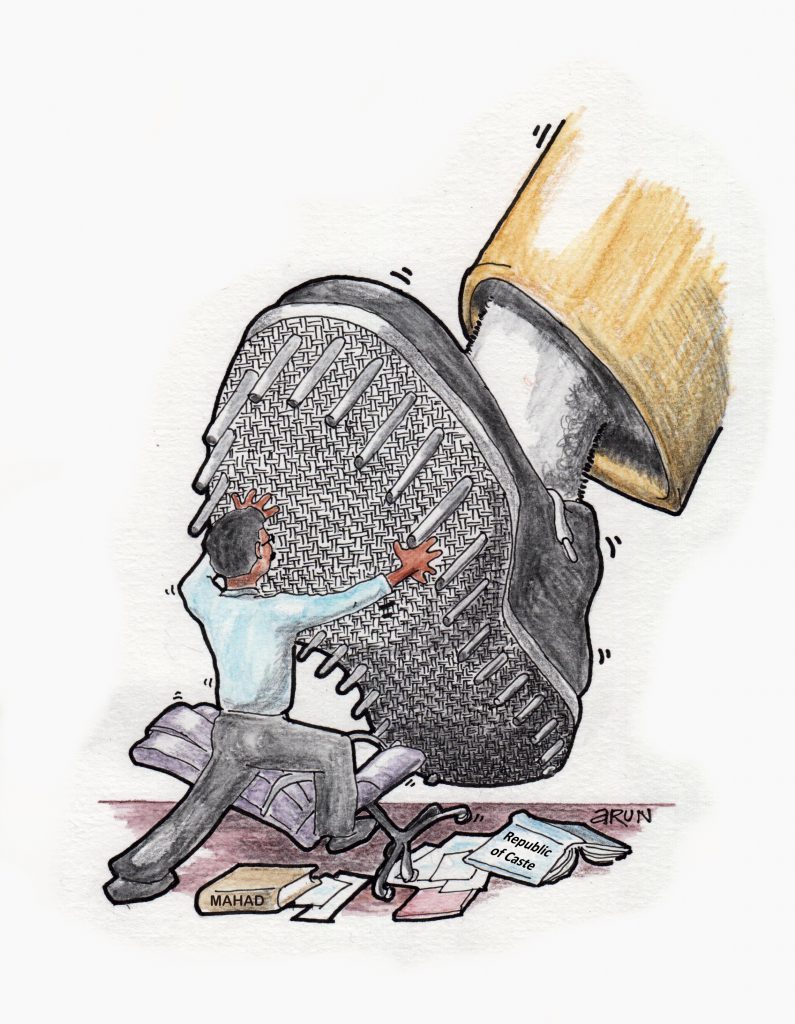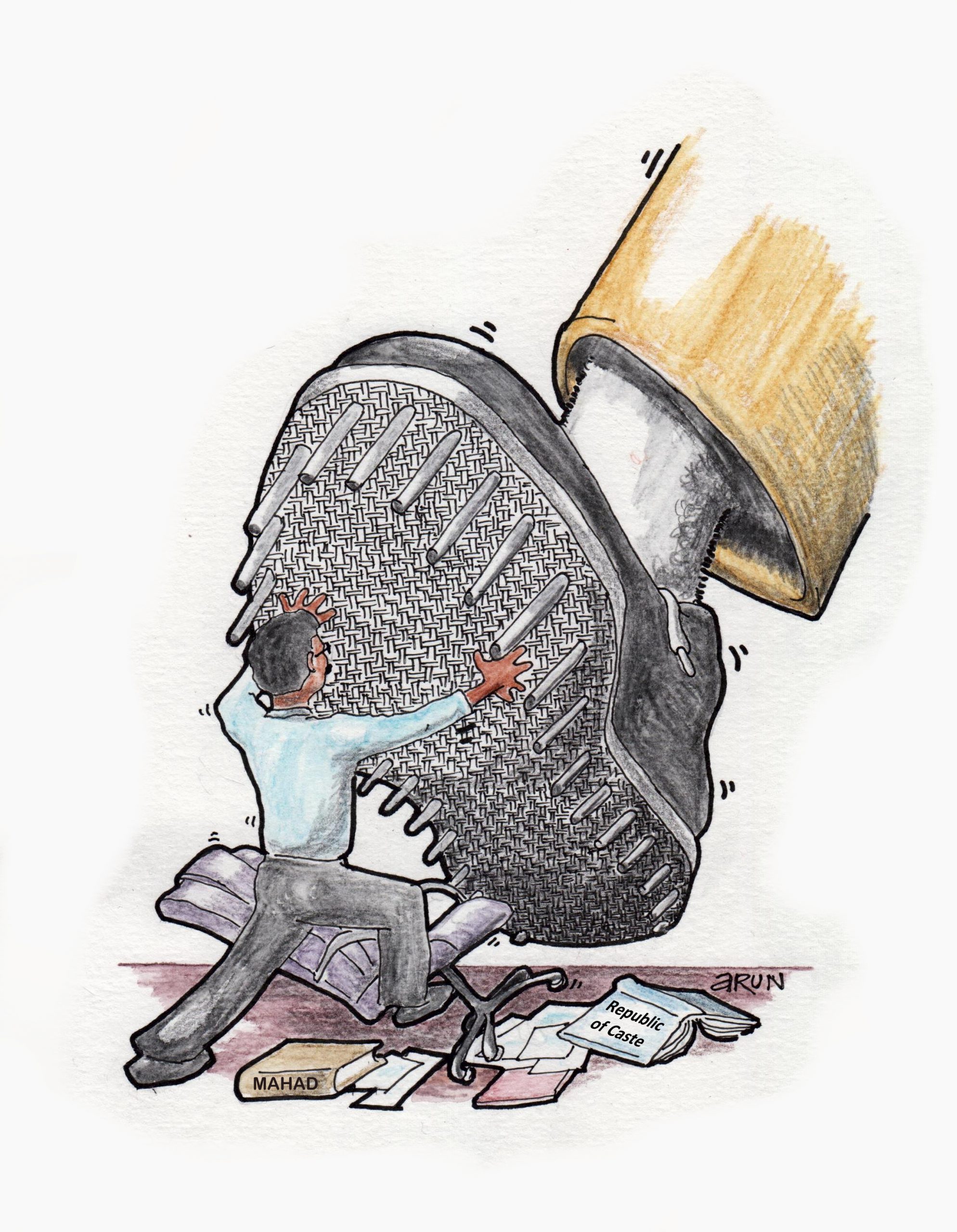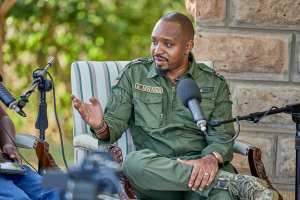
BK-16 Prison Diaries: Anand Teltumbde reflects on his arrest and incarceration

To mark six years of the arbitrary arrests and imprisonment of political dissidents in the Bhima Koregaon case, The Polis Project is publishing a series of writings by the BK-16, and their families, friends and partners. (Read the introduction to the series here.) By describing various aspects of the past six years, the series offers a glimpse into the BK-16’s lives inside prison, as well as the struggles of their loved ones outside. Each piece in the series is complemented by Arun Ferreira’s striking and evocative artwork.
Though I have been active in the civil-rights movement for over four decades, contributing to defence of the states’ hapless victims, I never imagined that I myself would land up in jail one day as those we defended. Even after the Pune police arrested five activists in connection with the violence at Bhima-Koregaon on 1 January 2018; even after the cops read out a letter purportedly written by a Maoist functionary to me, as they recovered from the hard disk of one of the arrestees and obviously implicated me into the crime; even after they raided my house in the campus of Goa Institute of Management in our absence—I thought they might not arrest me.
My delusion about my eminence was rudely demolished when they arrested me as I alighted from the Kochi-Mumbai flight at the Mumbai airport on 2 February 2019, in the wee hours of the morning, as though I was a fugitive. I was locked up for 13 hours before the court set me free, announcing my arrest illegal because I still had the protection of a Supreme Court order allowing me to seek anticipatory bail within a period of 30 days. The court process continued thereafter and ended with an order to surrender to the National Investigation Agency, to which the case had been transferred in intervening time. I surrendered on 14 April next year, the birth anniversary of Babasaheb Ambedkar and fatefully from his own house, where my wife and I were trapped during the sudden lockdown declared by Narendra Modi.
I spent 31 months in jail before getting bail. The experience convinced me that jail is where the state locks away its detractors, using the device called criminal justice system, which in turn uses selective enforcement, in order to protect the interests of the ruling class. Therefore, the criminal justice system effectively acts as a repressive state apparatus by making the ruled ones conform, not to the rule of law but to the will of the state, with the fear of punishment. In India, even before the advent of current fascist regime, the preponderance of undertrials belonged to the marginal communities like Dalits, Adivasis, Muslims and Christians. The fascist regimes do it by doing away the rule of law itself to terrorise multitudes of people into silence.
I was “deposited”—in the language of the NIA officials—into Taloja Central Prison after 11 days of custody, supposedly for interrogation. By then you are adequately accustomed to humiliation, and no longer mind the stripping before admission to the jail, which of course is religiously repeated every time you are admitted from outside even though you are guarded by a number of policemen. Once in, you are under the extreme police autarchy, in which the jail superintendent’s word is law. The constitution says that the detainees do not lose any of their fundamental rights except for liberty. But here you are denuded of every right unless and until you re-obtain it from the courts of law.
What is amazing is that there is no distinction made between undertrial and convict prisoners. Undertrials have not been pronounced guilty yet, and should be presumed innocent, by law, and hence be entitled to all reasonable facilities for dignified human living. But instead, he is discriminated even vis-à-vis a convict. Whereas the convicts are entitled to paroles and furloughs by the state governments—I recall them for Ram Rahim and scores of others—the undertrials like us did not have any such rights. Even in the dire humanitarian conditions such as death of family members, we had to struggle to get a temporary bail from the courts, which could take any number of days.
In my own case, when my younger brother was killed in a police encounter, I sought permission to be released on bail for fifteen days, using the precedence of co-accused who had been allowed to attend to the rituals after the death of their parents. As the eldest son, I sought to console my 90-year-old mother after this terrible loss. The court granted me permission to see her for two days, but escorted by the police, on the conditions that I would not speak to any person other than my mother and that I would be kept during nights in police custody. My mother, from whom the fact of my arrest was well hidden by all my siblings—by informing her that I was stuck abroad because flights were not operating due to the pandemic—would have died of shock seeing me surrounded by the police. There were no such conditions in the precedents that I had relied on. Moreover, unlike my co-accused who could fly to their places unescorted, I was to be taken by police by train and road, which was impossible for me to endure due to my chronic spondylitis. As a result, I decided not to avail of the permission and informed my lawyer accordingly.
The major risk one faced in prison was non-availability of medical attention. The jail officials kept claiming that the prison hospital was well-equipped, even though it did not have doctors, compounders, nurses or diagnostic equipment, which we well exposed to the courts. They would not take prisoners to the outside hospitals as long as possible, which resulted in many custodial deaths.
During my incarceration, I suffered a violent attack of COVID-19 for three days. The second day itself, I had sent a word to the jailor for sending me to JJ Hospital. He came to me, and in my debilitated condition, walked me to the superintendent’s office, who did not have slight courtesy to allow me to sit. Instead, he tried to argue that I did not have COVID. I lost my temper and threatened him that if word reached outside, he would face the music. I knew it meant nothing to him. No doctor visited me. The only medical attention I received came from fellow prisoners who worked in the prison hospital, and administered saline with whatever medicine they might have been advised. They would literally wrestle to get the needle into my veins every time. I had a tough time, with violent bouts of vomiting and not being able to get up.
Miraculously, on the fourth day, the bouts subsided and I was out of danger. Only after a month or so did they begin testing for COVID infection with some select prisoners, including me. When the results of the anti-gen test were received, the Chief Medical Officer simply said to me that I had already contracted it. I uselessly retorted, “What if I had died of it?” The answer that he did not speak out was simple—he would have disposed of my dead body, as they did for many others. After all, no body dies of COVID as such. It is no surprise that numerous studies have since pointed out that the Indian government grossly undercounted its COVID death toll, by almost one-tenth of the actual number, by some estimates.
This callous process of not arranging requisite medical treatment to prisoners has taken a toll of the precious life of one of our co-accused, Father Stan Swamy!
We, the BK-16 prisoners, were not ordinary prisoners, as the jail staff also became well aware. We resisted each unjust move with arguments, challenging them in courts, and even by resorting to agitations like fasts—the only form of protest available to prisoners, and incriminated in law. Ordinary prisoners did not have any option but to accept the unjust actions by jail authorities. Prisoners were whipped for nothing, beaten to be crippled for minor demeanours, and punished with suspension of mulaqats, the last of which even we suffered.
Jails are flaunted as centres of reform and rehabilitation, but as we experienced, they are the dens of sadism, corruption and dehumanisation. It may need a book to recount the whole saga.
Related Posts
BK-16 Prison Diaries: Anand Teltumbde reflects on his arrest and incarceration

Though I have been active in the civil-rights movement for over four decades, contributing to defence of the states’ hapless victims, I never imagined that I myself would land up in jail one day as those we defended. Even after the Pune police arrested five activists in connection with the violence at Bhima-Koregaon on 1 January 2018; even after the cops read out a letter purportedly written by a Maoist functionary to me, as they recovered from the hard disk of one of the arrestees and obviously implicated me into the crime; even after they raided my house in the campus of Goa Institute of Management in our absence—I thought they might not arrest me.
My delusion about my eminence was rudely demolished when they arrested me as I alighted from the Kochi-Mumbai flight at the Mumbai airport on 2 February 2019, in the wee hours of the morning, as though I was a fugitive. I was locked up for 13 hours before the court set me free, announcing my arrest illegal because I still had the protection of a Supreme Court order allowing me to seek anticipatory bail within a period of 30 days. The court process continued thereafter and ended with an order to surrender to the National Investigation Agency, to which the case had been transferred in intervening time. I surrendered on 14 April next year, the birth anniversary of Babasaheb Ambedkar and fatefully from his own house, where my wife and I were trapped during the sudden lockdown declared by Narendra Modi.
I spent 31 months in jail before getting bail. The experience convinced me that jail is where the state locks away its detractors, using the device called criminal justice system, which in turn uses selective enforcement, in order to protect the interests of the ruling class. Therefore, the criminal justice system effectively acts as a repressive state apparatus by making the ruled ones conform, not to the rule of law but to the will of the state, with the fear of punishment. In India, even before the advent of current fascist regime, the preponderance of undertrials belonged to the marginal communities like Dalits, Adivasis, Muslims and Christians. The fascist regimes do it by doing away the rule of law itself to terrorise multitudes of people into silence.
I was “deposited”—in the language of the NIA officials—into Taloja Central Prison after 11 days of custody, supposedly for interrogation. By then you are adequately accustomed to humiliation, and no longer mind the stripping before admission to the jail, which of course is religiously repeated every time you are admitted from outside even though you are guarded by a number of policemen. Once in, you are under the extreme police autarchy, in which the jail superintendent’s word is law. The constitution says that the detainees do not lose any of their fundamental rights except for liberty. But here you are denuded of every right unless and until you re-obtain it from the courts of law.
What is amazing is that there is no distinction made between undertrial and convict prisoners. Undertrials have not been pronounced guilty yet, and should be presumed innocent, by law, and hence be entitled to all reasonable facilities for dignified human living. But instead, he is discriminated even vis-à-vis a convict. Whereas the convicts are entitled to paroles and furloughs by the state governments—I recall them for Ram Rahim and scores of others—the undertrials like us did not have any such rights. Even in the dire humanitarian conditions such as death of family members, we had to struggle to get a temporary bail from the courts, which could take any number of days.
In my own case, when my younger brother was killed in a police encounter, I sought permission to be released on bail for fifteen days, using the precedence of co-accused who had been allowed to attend to the rituals after the death of their parents. As the eldest son, I sought to console my 90-year-old mother after this terrible loss. The court granted me permission to see her for two days, but escorted by the police, on the conditions that I would not speak to any person other than my mother and that I would be kept during nights in police custody. My mother, from whom the fact of my arrest was well hidden by all my siblings—by informing her that I was stuck abroad because flights were not operating due to the pandemic—would have died of shock seeing me surrounded by the police. There were no such conditions in the precedents that I had relied on. Moreover, unlike my co-accused who could fly to their places unescorted, I was to be taken by police by train and road, which was impossible for me to endure due to my chronic spondylitis. As a result, I decided not to avail of the permission and informed my lawyer accordingly.
The major risk one faced in prison was non-availability of medical attention. The jail officials kept claiming that the prison hospital was well-equipped, even though it did not have doctors, compounders, nurses or diagnostic equipment, which we well exposed to the courts. They would not take prisoners to the outside hospitals as long as possible, which resulted in many custodial deaths.
During my incarceration, I suffered a violent attack of COVID-19 for three days. The second day itself, I had sent a word to the jailor for sending me to JJ Hospital. He came to me, and in my debilitated condition, walked me to the superintendent’s office, who did not have slight courtesy to allow me to sit. Instead, he tried to argue that I did not have COVID. I lost my temper and threatened him that if word reached outside, he would face the music. I knew it meant nothing to him. No doctor visited me. The only medical attention I received came from fellow prisoners who worked in the prison hospital, and administered saline with whatever medicine they might have been advised. They would literally wrestle to get the needle into my veins every time. I had a tough time, with violent bouts of vomiting and not being able to get up.
Miraculously, on the fourth day, the bouts subsided and I was out of danger. Only after a month or so did they begin testing for COVID infection with some select prisoners, including me. When the results of the anti-gen test were received, the Chief Medical Officer simply said to me that I had already contracted it. I uselessly retorted, “What if I had died of it?” The answer that he did not speak out was simple—he would have disposed of my dead body, as they did for many others. After all, no body dies of COVID as such. It is no surprise that numerous studies have since pointed out that the Indian government grossly undercounted its COVID death toll, by almost one-tenth of the actual number, by some estimates.
This callous process of not arranging requisite medical treatment to prisoners has taken a toll of the precious life of one of our co-accused, Father Stan Swamy!
We, the BK-16 prisoners, were not ordinary prisoners, as the jail staff also became well aware. We resisted each unjust move with arguments, challenging them in courts, and even by resorting to agitations like fasts—the only form of protest available to prisoners, and incriminated in law. Ordinary prisoners did not have any option but to accept the unjust actions by jail authorities. Prisoners were whipped for nothing, beaten to be crippled for minor demeanours, and punished with suspension of mulaqats, the last of which even we suffered.
Jails are flaunted as centres of reform and rehabilitation, but as we experienced, they are the dens of sadism, corruption and dehumanisation. It may need a book to recount the whole saga.
SUPPORT US
We like bringing the stories that don’t get told to you. For that, we need your support. However small, we would appreciate it.






